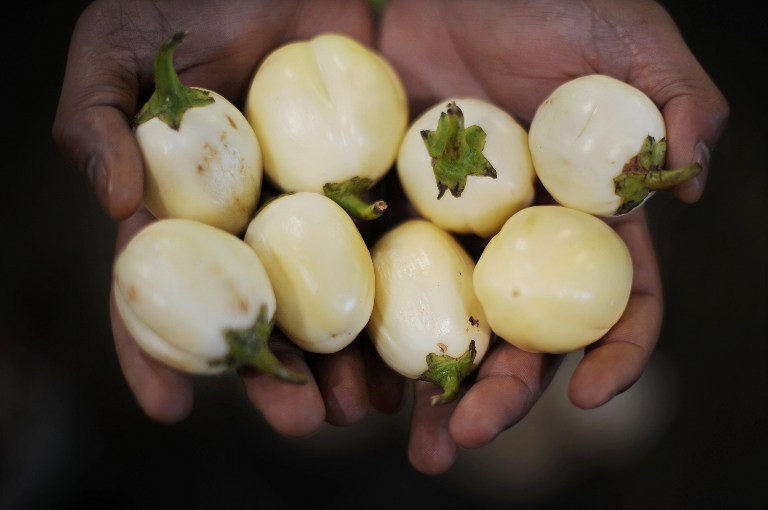There are some things about public gatherings in Ghana’s capital Accra that are guaranteed. A certain amount of dust and Atlantic spray on the breeze, a sound system blaring Azonto – a local music sensation – just a bit too loud, fearless children lining up to show off their moves, and an orderly row of canopies where the hot and the tired sit down on plastic chairs and take stock.
But if you looked a little closer at the fair in Ako Adjei park on Saturday, you would have found that what appeared a typical Accra event was quietly masking something quite unusual: a farmers’ market. The dozen or so small-scale producers selling their wares at The Accra Green Market were busily making history as participants in Ghana’s first ever fair for locally grown, sustainable, organic produce.

“This is a great way to give exposure to organic, local products,” says Jeffrey Mouganie, 22, founder of Moco Foods, an organic company that produces local forest honey and fiery chilli sauce, guaranteeing a traceable supply chain and hiring workers with disabilities. “The only space we usually get to market our products are at the bazaars of international schools, where we sell to a lot of expats,” he says. “But we need more markets like this – the best feedback we have had for our products is from Ghanaians.”
Moco’s Savannah Honey, on sale here for 10 Ghana cedis – approximately £3 (R45) – is being exported to the UK where it will go on sale at Harrods and Selfridges for what the producers expect to be around five times that price. Also on sale, organic mushroom wine – said to be a treatment for practically every medical condition from sclerosis to high blood pressure, asthma and “sexual weakness” – pak choi, gloriously frothy-leaved heads of broccoli, watermelon, small, knobbly carrots, and tough-skinned, tangy nectarines full of seeds and sweet-sour juice.
The organisers of the market believe they are part of a new trend towards sustainable, organic and local food, which they say goes hand in hand with the growth of Ghana’s new middle class. “Things in Ghana are changing – it is no longer a poor country but a middle-income country. And because of that, people are more interested in what they eat,” says Edison Gwenda Abe, 29, founder of Agripro – a mobile application company that provides farmers with access to marketplaces and which organised the Accra Green Market. “In East Africa, farmers’ markets are already really popular, but in West Africa, there is nothing like this. We plan to take it to different locations in Ghana, and we have had interest from Nigeria too.”
New interest in organic food
Constance Korkoi Tengey, founder of Immaculate Gold Beads, Mushrooms and Snails, is typical of the kind of small-scale grower whose products the market is designed to showcase. An energetic 62-year-old who carefully dishes out mushroom sandwiches, mushroom salad and mushroom gari foto – a veggie version of a popular Ghanaian dish made from cassava tubers – Tengey began growing mushrooms in her back garden seven years ago and says sales are on the rise.
“I eat a lot of mushrooms as a substitute for meat, and I’ve noticed that I don’t gain as much weight, and it keeps me looking younger,” Tengey says. “People in Ghana are becoming more health-conscious these days, they are really showing an interest in my products. It’s a profitable business for me.”
But it’s not only shoppers who are fuelling Ghana’s new interest in organic food. The city’s ever expanding directory of hotels, restaurants and cafes has an insatiable appetite for local products and high quality produce. “There are a lot of new eateries bringing in foreign chefs, and as a result the quality is getting higher,” says Sadiq Banda, an organic grower in Accra who supplies some of the city’s five-star hotels.
“Chefs are always looking for the best produce, and there is a great need for more local food producers to supply them. The Ghanaian middle class is growing too, and becoming more interested in quality. But Ghanaians are still mainly interested in conspicuous consumption – they do not tend to spend money on high-quality things unless other people can see them doing it, and fresh produce is not yet a priority.”
Ghana may still have some way to go in grasping the concept of organic, whole foods. Alongside the organic avocados on one stall were tins of corned beef, canned sardines and mayonnaise, where young women were zealously composing “salad” – a concoction of oily, processed products with a dash of fresh vegetable to top it off. And Ghana being Ghana, there is a strong affection for the deep-fried. My taste award went to Tengey’s “Kentucky Fried Mushrooms” – not blessed with a name that conjures up all things fresh, small-scale and local, but they tasted quite simply amazing.
Afua Hirsch for the Guardian Africa Network

Comments are closed.